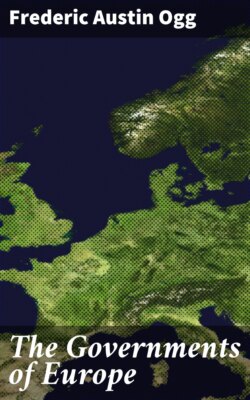Читать книгу The Governments of Europe - Frederic Austin Ogg - Страница 61
На сайте Литреса книга снята с продажи.
VII. The Parties of To-day
Оглавление169. Significance of "Liberal" and "Conservative."—Of the four political parties of Great Britain to-day one, the Irish Nationalist, is localized in Ireland and has for its essential purpose the attainment of the single end of Irish Home Rule;[230] another, the Labor party, is composed all but exclusively of workingmen, mainly members of trade-unions, and exists to promote the interests of the laboring masses; while the two older and more powerful ones, the Liberal and the Conservative or Unionist, are broadly national in their constituencies and well-nigh universal in the range of their principles and policies. It is essential to observe, however, that while the programme of the Nationalists is, at least to a certain point, perfectly precise, and that of the Laborites is hardly less so, there is no longer, despite the heat of recurring electoral and parliamentary combats, much that is fundamental or permanent in the demarcation which sets off the two major parties the one against the other. Even the names "Liberal" and "Conservative" denote in reality much less than might be supposed. During the generation which began with the Reform Act of 1832 the Liberals, indeed, extended the franchise to the middle classes, reformed the poor law, overhauled the criminal law, introduced a new and more satisfactory scheme of municipal administration, instituted public provision for elementary education, enacted statutes to safeguard the public health, removed the disabilities of dissenters, and assisted in the overthrow of the protective system. But if the Conservatives of the period 1830–1870 played, in general, the rôle implied by their party designation, their attitude none the less was by no means always that of obstructionists, and in the days of the Disraelian leadership they became scarcely less a party of reform than were their opponents. Beginning with the Reform Act of 1867, a long list of progressive and even revolutionizing measures must be credited to them, and in late years they and the Liberals have vied in advocating old age pensions, factory legislation, accident insurance, housing laws, and other sorts of advanced and remedial governmental action. The differences which separate the two parties are not so much those of principle or of political dogma as those of policy respecting immediate and particular measures, and especially those of attitude toward certain important organizations and interests. The Liberals assert themselves to be more trustful of the people and more concerned about the popular welfare, but the Conservatives enter a denial which possesses plausibility. It is probably true that the Liberals have fostered peace and economy with more resoluteness than have their rivals, yet so far as expenditures go the Liberal administration to-day is laying out more money than was ever laid out by a Conservative government in time of peace. The Liberals are seemingly more regardful of the interests of Scotland, Wales, and Ireland, but the difference is not so large as is sometimes supposed.
